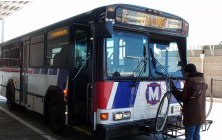SierraScape April - May 2010
Back to Table of Contents
by Cheryl Hammond
Transportation and Smart Growth Committee
photos courtesy of Ginger Harris
More drilling, more oil spills, more dirty air, and more of all the other adverse impacts of burning gasoline and diesel for transportation await us if we can't reduce our dependence on oil. As the smart growth guru James Howard Kunstler said, "Your reality check is in the mail." Prop A gives St. Louis County voters the chance to take action now against this future. The Sierra Club endorses Prop A. The election takes place April 6 for St. Louis County voters. St. Louis City voters have already voted to support transit and will not vote on Prop A during this election.
 Buses save fuel. Do the math. A bus that gets 5 miles per
gallon (mpg) is more fuel efficient than a single occupant car
that gets 25 mpg even if only 6 passengers are riding on that
bus. Remember that a single occupant car is using 95% of its
fuel to move the car itself. Imagine a 150 pound driver in a
3000 pound car. A GMC Yukon weighs 7100 pounds. A
Metrolink train
uses no diesel at all, as it is electric.
Buses save fuel. Do the math. A bus that gets 5 miles per
gallon (mpg) is more fuel efficient than a single occupant car
that gets 25 mpg even if only 6 passengers are riding on that
bus. Remember that a single occupant car is using 95% of its
fuel to move the car itself. Imagine a 150 pound driver in a
3000 pound car. A GMC Yukon weighs 7100 pounds. A
Metrolink train
uses no diesel at all, as it is electric.
Then consider congestion. Picture twenty passengers in a bus, then picture those same twenty passengers lined up one after the other on the highway in separate cars. Three billion gallons of gasoline are wasted every year in road congestion. Whether we personally ride transit or not, we get the same benefit of less congestion by making transit available for others to ride.
Environmental cost of oil. Oil is dirty from drilling to final use in your automobile engine. Because we use so much oil, we drill even in sensitive areas. Oil development in the Arctic National Wildlife Refuge faces a continual battle to forestall drilling there. The environmental destruction by Texaco/Chevron in the Ecuadorian rainforest has been criminal, not accidental. Getting the oil to refineries results in spills. On November 29, 2009, 46,000 gallons of crude poured into the Alaskan wilderness from a rupture in a pipeline in Alaska's North Slope, one of the biggest on-shore spills officials had ever seen. On January 23, 2010, a tanker ship loaded with oil collided with two barges at Port Arthur, Texas, resulting in a spill of 450,000 gallons of crude. The biggest oil spill in U. S. history occurred in 1989 when the Exxon Valdez ran aground on a reef and spilled 11 million gallons.
The refining process pollutes the air around the refinery with sulfur dioxide, nitrogen oxide, carbon dioxide, carbon monoxide, methane, chlorine, benzine, particulate matter, metals, and other chemicals. People living in the immediate vicinity of refineries suffer respiratory problems like asthma, coughing, and bronchitis, skin irritations, birth defects, and cancers. This is an environmental justice issue.
Our burning of gasoline and diesel for transportation creates another set of environmental and health problems. Tiny particulate matter from burning gasoline and diesel has been shown by epidemiological studies to increase the risk of death from heart disease. Other pollutants from the tail pipe contribute to ozone pollution and tailpipe toxics contribute to cancers. Before the refiners stopped adding lead to gasoline, lead was an important toxic from traffic, contributing to the well-known effects of lead on children, such as loss of IQ points and learning disabilities. Unfortunately, we are left with a legacy of lead in soil and dust from years of leaded gasoline used from 1923 to 1986, mostly around busy highways. Finally, the creation of carbon dioxide contributes to climate change and is the one most deleterious, most long lasting effect of the overuse of oil.
 Other transit benefits. Besides reducing use of oil and reducing
our carbon footprint, transit has many positive effects. Transit
reduces the need for car-related facilities, such as parking
lots and gas stations. This creates a pleasanter community which,
together with transit, promotes walking, bicycling, and healthier
living.
Other transit benefits. Besides reducing use of oil and reducing
our carbon footprint, transit has many positive effects. Transit
reduces the need for car-related facilities, such as parking
lots and gas stations. This creates a pleasanter community which,
together with transit, promotes walking, bicycling, and healthier
living.
Prop A will restore transit to the earlier level of service and will provide the funds to expand it. Without Prop A, the current level of service will decrease. With Prop A, transit service can grow, more people can use transit, and everyone will benefit.
And that is the message of the Prop A campaign: Some of us ride transit, all of us need it.
If you would like to help Sierra Club get out the vote on Prop A, contact the Sierra Club office at emg.sierraclub@earthlink.net or call 314 644-0890.